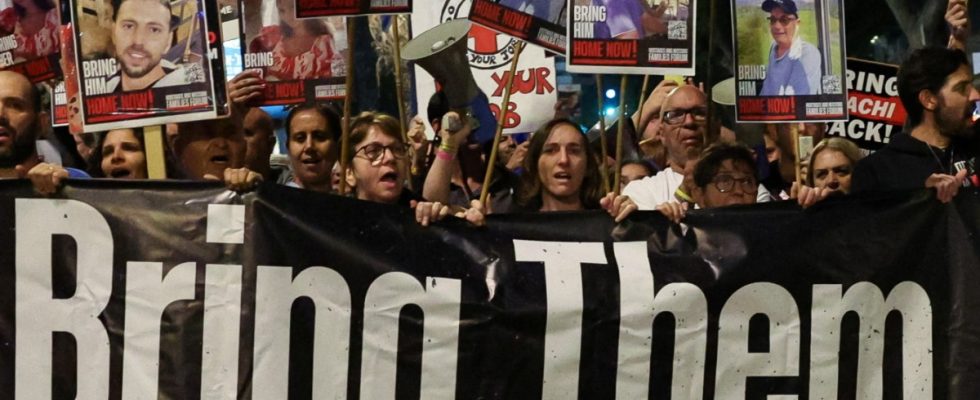“Now! Now!” hundreds of people shout over and over again. They shout this word in the direction of the Ministry of Defense, which is directly opposite the so-called “Geiselplatz”. This place in front of the Tel Aviv Museum was set up as a center by the relatives of the abductees, masses of people flocked to this rally this Saturday evening. Dozens are holding up signs with portraits of the abductees, 112 people are said to still be in the hands of Hamas, and according to the Israeli army, at least 20 are no longer alive. Instead of the usual request, some signs say “Take her home!” a new appeal: “Don’t kill them!”
This is a timely reference to what Prime Minister Benjamin Netanyahu calls an “unbearable tragedy” in his almost simultaneous press conference. Three hostages – Jotam Haim, Samar Talalka and Alon Lulu Shamriz – had managed to escape their captors in the northern Gaza Strip. But then they were shot by Israeli soldiers who mistakenly perceived them as a threat. The three young men had actually done everything right, as army chief Herzi Helevi attested to them on Saturday evening.
They took off their shirts so that they could not be suspected of carrying explosives on their bodies. They also wore a white cloth – a white flag – “so that we would understand them.” One is even said to have called for help in Hebrew. Nevertheless, two soldiers fired, which the army said was a violation of the rules of engagement. It should now be ensured that something like this cannot happen again, both the army chief and the Prime Minister assured during their appearances.
Suddenly there was silence…
When the names of the three hostages who were shot and that of the 27-year-old art student Inbar Heiman, whose death while held hostage was announced on Saturday, were mentioned at the rally, there was suddenly silence. The crowd is silent for three minutes, many hold each other’s arms or hands, and tears also flow. Among the speakers who expressed their solidarity with the families and friends of the hostages at this rally was German Ambassador Steffen Seibert. He speaks in Hebrew and wears a necklace with a plaque engraved with the words “Bring her home” in Hebrew and English.
The demands are sometimes presented by the relatives in an angry tone, driven by desperation. Everyone is demanding that the government finally move and once again offer Hamas a deal that has led to a week-long ceasefire and the release of 105 hostages, for which 240 Palestinian prisoners were released from Israeli custody.
The feeling that the clock is ticking is also conveyed by a pendulum swinging back and forth, which is displayed several times on huge screens. Noam Perry, whose father is in the hands of Hamas, accused Netanyahu’s war cabinet of describing military pressure as necessary for the hostages to be released. “Now more and more hostages are coming back as corpses,” complained Perry and called on the government: “We want them to stop the fighting and start negotiations.”
“What are you waiting for?”
Two hours before the start of the demonstrations, representatives of the families of the abductees had already turned to the government: “Act now to bring the hostages home. Alive,” shouted Ruby Chen, father of 19-year-old Itay. Raz Ben Ami, who was released just over two weeks ago and whose husband Ohad is still in Hamas’ control, said she had warned the government of additional danger to the hostages. “Unfortunately, we were right,” said the 57-year-old, referring to the three hostages who were mistakenly shot by the Israeli army. “Military action alone will not save the lives of the hostages.” Addressing the government, she said: “You promised to bring her home alive. What are you waiting for?”
The Israeli prime minister addressed this in a press conference three hours later. He rejected calls for a ceasefire. The ground offensive will continue. Military pressure on Hamas must be maintained – “without it we have nothing,” said Netanyahu. “We are more determined than ever to press on until victory, until we destroy Hamas and bring back all of our abductees.” He also reiterated that the Gaza Strip should not be ruled by Fatah, the leading party of the Palestinian Authority in the West Bank, after the war.
Netanyahu: “Proud that I prevented the creation of a Palestinian state”
Asked by a journalist what his vision is for the Gaza Strip after the war, Netanyahu replied: The Gaza Strip must be demilitarized. The Israeli armed forces must be responsible for security because there is no one else to ensure the fight against terrorism. Netanyahu added: “I am proud that I prevented the creation of a Palestinian state. Because today everyone can understand what this Palestinian state could have looked like, now that we have seen the small Palestinian state in Gaza.”
Netanyahu did not want to comment directly on whether there would be further negotiations on a deal to release more hostages. But the head of the Israeli secret service Mossad, David Barnea, is said to have met with Qatari Prime Minister Mohammed bin Abdulrahman Al Thani in Oslo this weekend. Hamas also came forward and cited a ceasefire as a condition for further negotiations. Late in the evening, the war cabinet met at the Defense Ministry headquarters in Tel Aviv to discuss how to proceed.
Opposite, on the “Geiselplatz”, the crowds had already dispersed at this late date. But what remains is the long table with more than a hundred chairs that remain empty as a reminder of the hostages who have been held in the Gaza Strip for 71 days.

